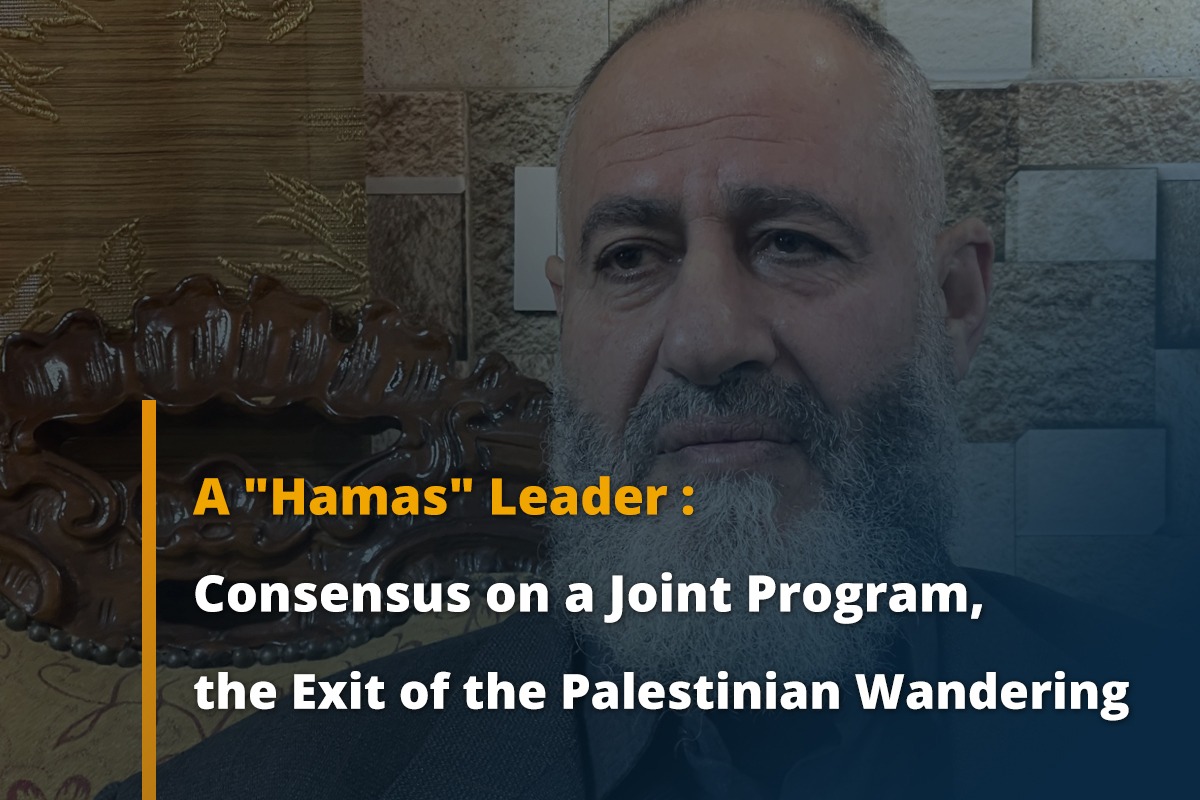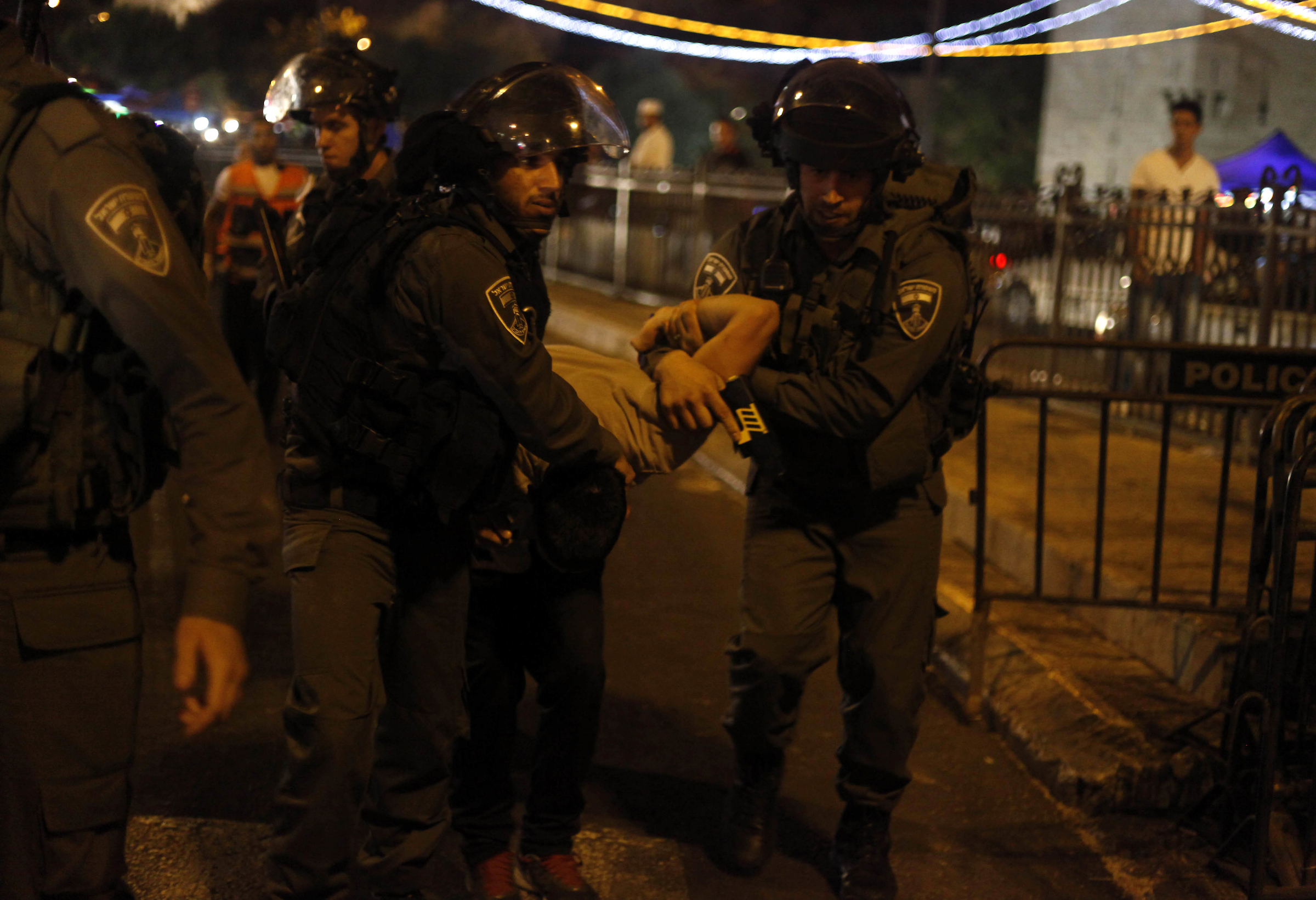Nayef Rajoub, a prominent Hamas leader in the West Bank, said that the Palestinians are suffering from a major political impasse, and are “heading towards the unknown.”
In an exclusive interview, a few days after his release from Israeli prison, he saw that the way out of the “current Palestinian state of wandering” is to agree on a “common political program”.
The occupation authorities released Rajoub, who resides in the town of Dura in Hebron, in the southern West Bank, last Tuesday.
“(We) are heading into the unknown for now,” Rajoub added.
He described the Palestinian political situation as “very bad”, blaming those who “signed the Oslo Accords in 1993 (between the PLO and Israel) and obstructed the first (1987) and the second (2000) intifada, in exchange for a mirage.
He added, “What was achieved from Oslo is the recognition of the occupation, not with the state of Palestine, nor with an independent Palestinian entity, but with the PLO being the sole legitimate representative of the Palestinians “in return for a full recognition of the legitimacy of the occupation over the majority of historical, religious and geographical Palestine.”
In light of this reality, Rajoub saw that the Palestinians are “heading towards the unknown until now.”
He considered that the way out is the factions’ agreement on a joint program that “goes beyond (the Oslo Agreement) (for peace between the Palestine Liberation Organization and Israel in 1993), through which it can confront the occupation” and force it to withdraw from Palestinian land.
Rajoub spent 8 months in administrative detention (without charge or trial), bringing the total he spent in the occupation prisons to more than 11 years, including 6 years in administrative detention.
Rajoub is the brother of Jibril Rajoub, a member of the Central Committee of the “Fatah” movement. He was previously elected as a member of the Legislative Council as a representative of the “Hamas” movement, which won the last elections held in 2006 and served as the Minister of Religious Endowments.
Algeria is one of the biggest supporters of Palestine
Rajoub praised Algeria for hosting the Palestinian factions, in an attempt to make a breakthrough towards conducting Palestinian reconciliation and ending the division.
He said: “There is no doubt that Algeria had a positive attitude in dealing with the Palestinian people, and is considered one of the largest Arab supporters of the Palestinian cause and the Palestinian people.”
He added, “We congratulate and appreciate any step that pushes towards ending the division and uniting the Palestinian people in facing the occupation, and the dangers that the occupation and settlers pose to the Palestinian people in the land of Palestine.”
However, he expressed his regret, “because many dialogues took place and many agreements were agreed upon,” and soon they were thrown into disrepute, the most recent of which was the 2021 agreement when it was agreed to hold legislative elections, the presidency, and the National Council.
And this January, five factions were invited to bilateral dialogues with Algerian officials ahead of a comprehensive meeting, the date of which has not been announced.
And Algerian President Abdel Majid Tebboune had previously announced, on December 6, in a press conference, after receiving his Palestinian counterpart Mahmoud Abbas at the presidential headquarters in Algeria, his country’s intention to host an inclusive conference of the Palestinian factions.
The Palestinian arena has been suffering from a political and geographical division, since 2007, when “Hamas” controls the Gaza Strip, while the Palestinian government formed by the “Fatah” movement, led by President Abbas, administers the West Bank.
Conducting selective elections is unacceptable
Rajoub said that holding local elections in “small villages and bedouin farms is unacceptable,” adding that the prisoners also “reject this selectivity in renewing Palestinian legitimacy.”
He said that the most important for the Palestinian people and for the Palestinian prisoner are the major issues, and that there should be representatives of the Palestinian people, and that they have an elected president “after the term of the current Palestinian president (Mahmoud Abbas) has expired, whose term of office has exceeded 17 years, in violation of the Palestinian Basic Law and Law and the internal Palestinian commitment.
On more than one occasion, Hamas announced its refusal to hold “fragmented” municipal and village council elections, and said that it is ready to hold comprehensive elections (the National and Legislative Councils, the presidency, and local councils), simultaneously or with a specific timetable agreed upon by all Palestinian parties.
Rajoub believes that the division ends first with a sincere intention of all parties.
He continued: “The issue of internal disagreement occurs in all modern revolutions, nations, peoples and states. The important thing is to overcome internal disagreement, end the state of division, unite the two parts of the country, and entrench themselves to confront the dangers of occupation and settlers that threaten the Palestinian present and future.”
He added that the division also ends with “practical steps, for it is not enough for us to meet and for agreements to remain ink on paper.”
He wondered: “What is the point of meeting in Algeria and the most intense political arrests in all Palestinian cities in the West Bank, this reflects the intention of a party not to make any breakthrough in the state of stalemate and disagreement.”
Regarding Fatah’s nomination, Hussein al-Sheikh, a member of its Central Committee, as a candidate for membership in the Executive Committee of the Palestine Liberation Organization, Rajoub said that “any change or alteration (in the organization) remains without a positive impact on the Palestinian situation and the Palestinian future.”
He added: “The Liberation Organization in the Palestinian arena is almost without a trace (…) and has no role in confronting the onslaught of the occupation and the onslaught of settlers.”
States aligned with our enemy
Regarding the American role in the region, Rajoub said that “it was, is, and will remain completely aligned with Israel, and with our enemy who occupies the land and displaces the people (…) and I do not think that this position will change one day, and if it changes, it is in the interest of the occupation and not the other way around.”
According to the Palestinian leader, the Palestinian people do not rely on the American position, not even on the entire Western position, “even though the European position is biased towards Israel, but it is less hostile to the Palestinian people.”
The hardest thing for prisoners to suffer
Regarding the most prominent difficulties the prisoners face, Rajoub said that they are looking forward to their release, after hundreds of them spent dozens of years in prisons.
He added that the Palestinian prisoner who spent 42 years in prison (like Nael Barghouti and Karim Younes), is awaiting release and an hour to breathe the air of freedom.
He said that the prisoners are facing other difficult issues, including that “the health situation is very bad: no treatments, no hospitals, no examinations.”
The Palestinian leader described the winter in prisons as “dream”, given that the prisoners were not exposed to severe cold and the lack of all blankets.
He continued: “When temperatures drop and on cold, rainy days, the prisoner does not move from under his blanket (cover) except to prayer, food or the toilet.
He stated that the prisoner does not get more than two blankets, and if there was no overcrowding in the prisoners’ rooms, they would not feel any warmth inside the rooms.
According to Rajoub, the area of the prison rooms is 20 square meters, and there are eight prisoners inside.
Regarding the prisoners’ motives for engaging in individual hunger strikes, he said that he was often against administrative detention, “which is detention without clear charges, and if there are any, only the judge and the Shin Bet (intelligence) knows it, and this contradicts all norms and laws.”
He pointed out that some prisoners have been detained for more than 60 months in administrative detention in succession, adding: “The administrative prisoner is sentenced for a period of 6 months, and while he is awaiting release, he is surprised by the extension for another 6 months.”
Rajoub said that the Israeli authorities’ neglect of the prisoner Hisham Abu Hawash’s 140-day strike (it was suspended on January 4th), indicates that “the prison administration was interested in thwarting the individual strike and preventing its recurrence.”
The deal is coming no matter how long the occupation takes
Regarding the prisoners’ follow-up to the possibility of concluding an exchange deal between Hamas and Israel, the leader Rajoub said, “The Palestinian prisoners, especially the female prisoners (those with life sentences), are holding out hope for a big deal.”
He added: “There is no doubt that there is a big deal on the horizon. There is talk of soldiers captured by the Palestinian resistance (in Gaza), and this will eventually force – even if it is prolonged – on the occupation to pay the price.”
He said: “All the prisoners are aware that not a single Palestinian prisoner who is sentenced to life imprisonment will not be released. Therefore, the hope has become to impose a new deal that will open the doors for them to return to their homes, enhanced and honored.”
He continued, “The Israeli occupation has no choice but to respond and release the Palestinian prisoners.”
Hamas has confirmed more than once that it keeps four Israelis inside the Gaza Strip, without revealing their fate or health status.
On the other hand, Israel detains about 4,600 Palestinians, including about 546 prisoners who are sentenced to life, according to the (non-governmental) Palestinian Prisoner Club.
Shortlink for this post: https://daysofpalestine.ps/?p=12960








